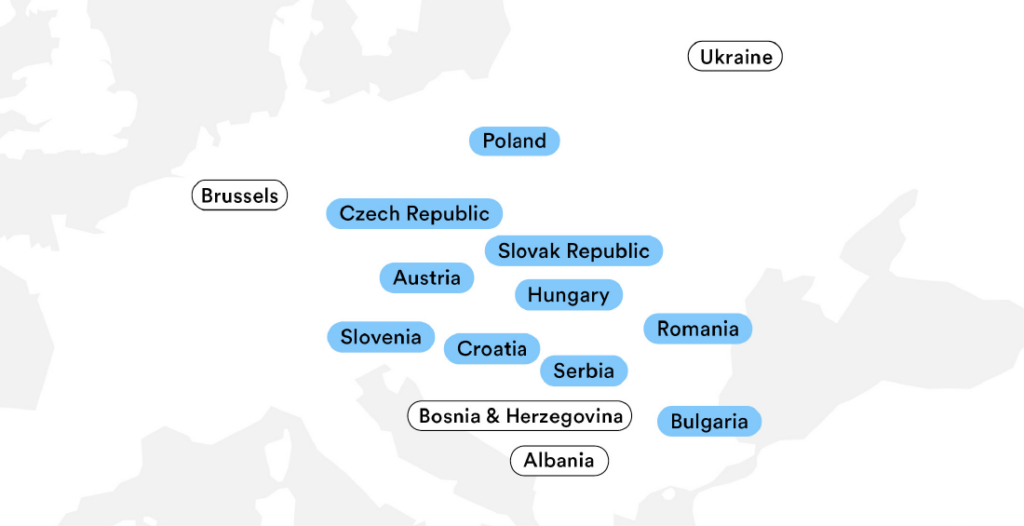Anti-corruption framework review in CEE & SEE
Transparency International (“TI”) has released its 2024 Corruption Perceptions Index (“CPI”), surveying 180 countries and territories. The CPI scores range from 0 (highly corrupt) to 100 (very clean), offering a snapshot of perceived public sector corruption across the globe. While the index is not without its limitations – it captures perceptions rather than absolute measures of corruption – it remains a leading benchmark for assessing corruption worldwide. In many ways, the CPI serves as a mirror, reflecting not only the visible cracks in public institutions but also the hidden fractures beneath the surface.
In 2024, no country achieved a perfect score. Over two-thirds of the countries surveyed fell below the midpoint of 50, with the global average stagnating at 43 – a figure that suggests there is still considerable room for improvement. This persistent trend paints a sobering picture: despite ongoing reform efforts, corruption remains a tenacious adversary, deeply embedded in the fabric of public institutions across much of the world.
Within the Wolf Theiss region, only four countries – Austria, Czech Republic, Poland and Slovenia – scored above the 50-point mark, while others continue to grapple with significant corruption challenges. While these figures may seem stable at first glance, a closer examination reveals a concerning downward trend. Austria, Croatia and Slovakia each saw a drop of more than three points, a significant shift in a metric where even small changes signal meaningful deterioration. According to TI, current corruption challenges reflect a combination of factors, including corruption’s role in obstructing key policy areas such as climate initiatives and environmental protection, in turn contributing to perceptions of weakened governance and ethical standards across the region. At the same time, high-profile political scandals, the mismanagement of public funds and attempts to undermine independent media have corroded public trust, leaving institutions vulnerable to further ethical decay.
To mark the release of this year’s CPI, we have prepared a comprehensive guide outlining the anti-corruption frameworks in place across several of our jurisdictions. This guide examines the legal structures, enforcement mechanisms and recent legislative developments aimed at combating corruption in both the public and private sectors. It also highlights key trends, such as the evolving role of corporate liability, the use of whistleblower protections and the implementation of compliance programmes. By providing a clear overview of these frameworks, our guide aims to support businesses, legal professionals and policymakers in navigating the complex terrain of anti-corruption legislation, while promoting best practices and fostering a culture of transparency and accountability across the region.

Download the full guide in English
Austria
Austria criminalises both public and private bribery. With regards to public bribery, laws comprehensively cover acts committed in violation of or even in performance of official duties —meaning that lawful actions by public officials can still be criminal if influenced by a bribe. Unlike some jurisdictions, Austria permits the receipt of certain benefits where no breach of duty occurs. Here, the legal doctrine suggests an upper limit of EUR 100, while the Supreme Court applies a case-by-case approach.
As well as individuals, legal entities can also be prosecuted for bribery offences, with corporate fines determined according to turnover and the nature of the offence. Unlike other systems, Austria imposes no general reporting obligation. However, whistleblowing mechanisms are in place for those who wish to report a crime, including through the website of the Public Prosecutor’s Office for the Prosecution of Economic Crimes and Corruption.
Austrian law does not allow plea agreements and negotiation over sentencing is illegal. However, statutes do offer a crown witness (Kronzeuge) provision – offenders who make a remorseful confession and provide substantial assistance may face alternative measures like fines or may have their cases withdrawn. Similarly, companies that cooperate with law enforcement may receive reduced fines or avoid prosecution entirely. Outside this programme, the withdrawal of bribery prosecutions is rare.
Download the Austrian chapter
Related experts
Bulgaria
Bulgarian law treats public bribery and private bribery as distinct crimes, each carrying specific legal consequences. Public bribery involves corrupt dealings with public officials and is liable to harsher penalties, while private bribery pertains to transactions among private entities.
Unlike many jurisdictions, Bulgaria does not recognise corporate criminal liability. Nevertheless, while companies cannot be held criminally liable, they may face administrative fines, loss of licences or exclusion from public tenders if their representatives engage in bribery. Discussions are ongoing about introducing corporate liability in order to align Bulgarian law with EU and OECD standards. For now, though, companies are only subject to administrative and civil penalties.
There is a general legal obligation for individuals, including public officials and private citizens, to report bribery. Failure to report can lead to criminal liability, particularly for public officials. The EU Whistleblowing Directive has been implemented through the Bulgarian Whistleblower Protection Act. However, anonymous reporting is not permitted unless filed under a different legal framework. Non-trial resolutions, such as plea bargains, are explicitly prohibited in public bribery cases but may be allowed for private bribery, subject to court approval.
Download the Bulgarian chapter
Related experts
Croatia
Croatian criminal law distinguishes between active and passive bribery, with specific offences covering bribery in economic operations, bankruptcy proceedings and public administration. Bribery involving “official or responsible” persons, including foreign public officials, is treated with particular severity. Additionally, bribery aimed at trading in influence constitutes a separate criminal offence. While Croatian law aligns with international standards, corruption remains prevalent, particularly at the local government level, as highlighted by the European Commission and OECD.
Companies in Croatia can be held criminally liable for bribery offences committed by a “responsible person” within the organisation. Failure to report bribery-related offences is a crime, particularly when involving offences punishable by five or more years of imprisonment, with stricter obligations for offences committed by public officials.
The only practical resolution reducing the extent of a full trial for bribery cases in Croatia is entering into a plea agreement, which is available for any criminal offence. Such agreements require the admission of guilt and are subject to court approval. The concept of effective remorse applies in certain bribery cases, offering potential sentence reductions for those who self-report before discovery.
Download the Croatian chapter
Related experts
Czech Republic
The Czech Republic has a comprehensive legal framework in place for combatting bribery and corruption, covering both public and private sectors. Notably, bribery of public officials is considered an aggravating circumstance, rather than a standalone offence.
Another distinctive feature is the legal obligation for both individuals and companies to report bribery offences and failure to do so constitutes a criminal offence. However, Czech attorneys are uniquely exempt from this reporting duty due to their legal privilege, which is narrowly defined in Czech law. This creates a complex landscape for cross-border investigations, as foreign attorneys and in-house counsel do not enjoy the same protections. As a result, Czech attorneys are often better suited to conduct internal investigations than external auditors or foreign legal professionals, particularly when confidentiality is paramount.
Cooperation with prosecutors, such as through internal investigations and voluntary disclosures, is viewed favourably but does not guarantee legal leniency unless a plea agreement is negotiated. Non-trial resolutions remain limited, though legislation currently going through Parliament may expand these options in the future.
Download the Czech chapter
Related experts
Hungary
Hungarian criminal law comprehensively addresses all forms of bribery, distinguishing between active offences (offering, promising or providing an unlawful advantage) and passive offences (accepting or soliciting such an advantage). These offences include bribery of public officials and bribery within judicial or administrative proceedings, each defined as separate crimes with specific legal consequences. Aggravating factors, such as the involvement of high-ranking officials or substantial bribes, result in harsher penalties.
While legal persons cannot be direct perpetrators of crimes under Hungarian law, they can still be held criminally liable if a natural person within the organisation is convicted. This derivative liability applies when a crime is committed to benefit the legal entity or is facilitated through its structure. Sanctions against legal persons range from fines and operational restrictions to dissolution. Notably, failure to report bribery is only a criminal offence for public officials, reflecting a narrower approach compared to jurisdictions with broader reporting obligations.
Non-trial resolutions, such as settlements, are limited in scope. Settlements can address the criminal liability of natural persons but do not extend to legal entities, even if implicated in the same proceedings. This separation underscores the strict division in Hungarian law between individual and corporate accountability in corruption cases.
Download the Hungarian chapter
Related experts
Poland
Poland has a detailed anti-corruption framework in place covering both active and passive bribery, and public and private bribery. Public bribery offences are dealt with particularly severely. Moreover, while the country has adopted a system of corporate criminal liability, its enforcement in corruption-related cases has so far proven relatively weak. For a legal entity to be held liable for a criminal offence, an individual must also be convicted.
While there is no general legal duty to report bribery, State and local government institutions are required to report corruption that they became aware of in connection with their activities. Poland currently recognises the possibility for the accused to request a conviction without trial. However, this avenue is unavailable in the case of felonies, in which cases no appeal is available against factual errors or disproportionate penalties.
Download the Polish chapter
Related experts
Romania
Romania’s anti-bribery and anti-corruption framework has recently evolved, notably with the 2024 law targeting bribery of foreign public officials in international business transactions, which aligns legislation with the country’s OECD accession efforts. This law establishes bribery involving foreign officials as a distinct offence, with higher sanctions placed on companies than is the case for domestic bribery cases. The implementation of the EU Whistleblowing Directive has led to increased whistleblower activity, potentially triggering reporting obligations for those receiving reports, who are not shielded by legal privilege. It is crucial to structure internal reporting channels effectively in order to manage this risk.
Both public and private sector bribery are criminalised, with no minimum value threshold for what constitutes a bribe. Corporate criminal liability, introduced in 2004, holds legal entities accountable for offences (including bribery and corruption) which are committed in their name or interest, regardless of structural changes like mergers or transformations.
Non-trial resolution is limited to plea agreements, which require the admission of guilt and the approval of the prosecutor. These agreements can be negotiated for crimes (including bribery offences) that carry a custodial sentence of up to 15 years, offering companies the possibility of reduced sanctions such as monetary penalties.
Download the Romanian chapter
Related experts
Serbia
Both public and private bribery are criminalised in Serbia, with bribery involving public officials attracting more severe penalties. While the ingredients of public and private bribery are similar, the law takes a stricter approach for corruption in public institutions.
Serbia does not recognise legal privilege in the same way as some jurisdictions but relies on the concept of “attorney secrets.” Serbian attorneys are required to maintain the confidentiality of all client information obtained during and after the provision of legal services. Companies with more than 10 employees must implement internal whistleblowing procedures to ensure impartial and independent investigations of reported misconduct.
For offences punishable by fines or imprisonment of up to three years, prosecutors may drop charges if further proceedings are deemed unnecessary. Serbian law also permits plea agreements, which must include a clear admission of guilt and be confirmed by the court. However, this mechanism remains underutilised in bribery-related cases, despite offering potential advantages over full-fledged criminal trials.
Download the Serbian chapter
Related experts
Slovak Republic
Slovakia’s anti-bribery and anti-corruption framework has recently undergone significant changes. In 2024, amendments to criminal law reduced the penalties for corruption-related offences and abolished the Special Prosecutor’s Office, with the latter’s responsibilities transferred to regional prosecutors.
Bribery in both the public and private sectors is criminalised and legal entities can be held liable for corruption offences. A general reporting duty applies to all individuals, including employees and managers, covering not only serious crimes with sentences over 10 years but also corruption-specific offences. Failure to report is a criminal offence.
While Slovak law recognises effective remorse, it does not extend to corruption offenses except in special cases of active remorse, which are limited to natural persons. The primary resolution mechanism for companies is the negotiation of a plea agreement with the public prosecutor, which requires the admission of guilt and the acceptance of sanctions, to which a discount may be applied.
Download the Slovak chapter
Related experts
Slovenia
In Slovenia, both public and private bribery are criminalised, with no minimum value required for a benefit to qualify as a bribe. There are clear legal limits on public officials when accepting gifts (up to EUR 100), while in the private sector, the intent behind benefits like hospitality or gifts determines their legality. Plea agreements are the primary means of resolving cases without going to full trial and require the admission of guilt and the approval of the court.
Bribery offences carrying a minimum custodial of three years must be reported if they are in progress and preventable. For crimes already accomplished, the general reporting duty applies only to crimes carrying a minimum custodial sentence of 15 years, therefore excluding bribery offences.
Slovenia protects whistleblowers under laws aligned with EU legislation. However, internal investigations can face challenges as far as legal privilege is concerned. The person in charge of investigating whistleblower reports must be appointed from among the company’s employees, meaning there is a risk that the investigation and its results may not be covered by legal privilege. This can be mitigated by appointing an attorney to assist in the investigation.
Download the Slovenian chapter

















